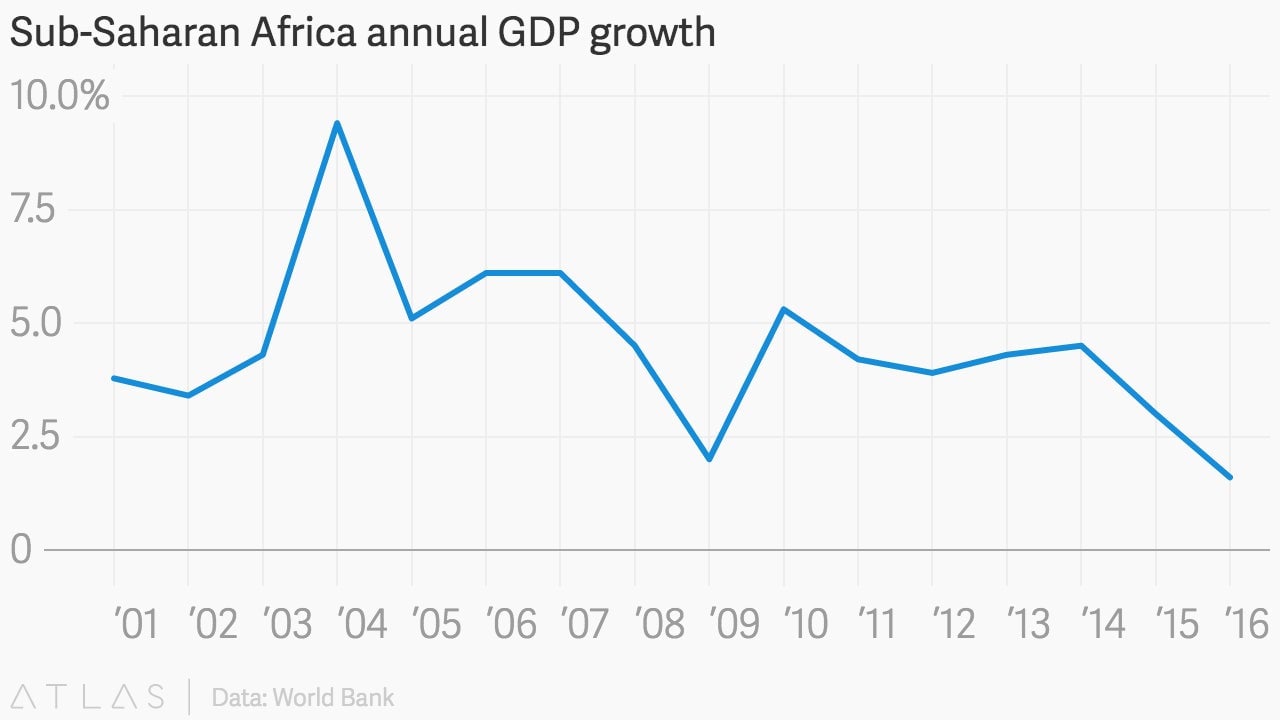Girl power, naira float angst, Africa’s slump
Hi, Quartz Africa readers!

Hi, Quartz Africa readers!
[insertSponsor]
Girl Talk
This week with International Day of the Girl Child, was a good opportunity to learn how much progress has been made with gender equality, but also how far we still have to go.
Unicef showed us how early in life girls fall behind in the gender equality stakes. One reason for that was how much more household chores they do than boys. Unsurprisingly, the data shows that in poorer countries, like many of those in sub Saharan Africa, that gap is wider. In poorer families, ‘household chores’ can be actual unpaid work such as street hawking in cities or working the farm in rural areas, rather than being in school.
A change in traditional attitudes and more education for girls is undoubtedly a key to making progress here. But then again, as we know from the saga of the kidnapped Chibok schoolgirls of Nigeria, even girls going to school can be under threat in some extreme circumstances. This week, 21 of those kidnapped girls returned home to much relief, but there are still nearly 200 of the original 276 believed being held by Boko Haram terrorists.
Attitudes to gender equality still have some way to go. Look at Nigerian president Buhari’s clumsy attempt at a “joke” saying his wife ‘belongs to my kitchen’ (while standing next to German chancellor Angela Merkel).
But we shouldn’t despair and give up. For one thing, there are many great African female role models to look up to—not just for young girls—but for all of us.
Take Thuli Madonsela’s seven-year run as South Africa’s public prosecutor which came to an end this week. It’s been one of the most impactful and influential of such roles on a continent beset with its fair share of corruption and mismanagement challenges.
Nigerian author (and new mother) Chimamanda Ngozi Adichie’s latest manifesto on how to raise a feminist child is a must-read in helping to educate all of us. As she writes: “Your feminist premise should be: I matter. I matter equally. Not ‘if only.’ Not ‘as long as.’ I matter equally. Full stop.”
Yinka Adegoke, Quartz Africa editor
Five stories from this week
Ivanka Trump’s Ethiopian-made shoes. The head of the Chinese shoe manufacturer Huajian, which makes shoes for the presidential candidate’s Donald Trump’s daughter, is moving production to Ethiopia where labor costs are cheaper, writes Lily Kuo.
Nigeria’s case study on how not to float your currency. Feyi Fawehinmi examines the process and early results of the Central Bank of Nigeria’s decision to float the naira. His conclusion? It’s been a bit of mess. “The Central Bank has once again gone down the rabbit-hole of price fixing and hobbling the markets.”
Africans can be superheroes too. A South African comic book series has launched titled “Ordinary Superheroes,” which does away from the caped superhero narratives of traditional comics. It creates stories of superheroes based on the lives of average Africans making an impact in their communities, writes Yomi Kazeem.
The world’s first commercial drone delivery service launched in Rwanda. The drones drop blood parcels on parachutes outside remote health centers replacing the use of motorbikes to get to these areas, writes Cassie Werber.
What would Madonsela do? South Africa’s public protector just wrapped up her seven-year master class on fighting corruption. Thuli Madonsela spent her last days in office uncovering more public wrongdoing, ensuring that her work to keep South Africa’s government accountable to it’s public will have a lasting impact, Lynsey Chutel reports from Johannesburg.
Chart of the Week
Sub Saharan Africa’s economic outlook is in a slump. Growth in the 45 countries that make up Sub-Saharan Africa will drop to 1.4% in 2016—its lowest level in more than 20 years, says IMF. The overall slump is led by several of the largest economies, explains Abdi Latif Dahir, but as many as 19 countries including Ethiopia, Tanzania and Côte d’Ivoire are going to see robust growth.

Other things we liked
Surviving terrorism and now famine in Nigeria. More than 3 million people in northeastern Nigeria, displaced and isolated by militants, are now facing one of the world’s biggest humanitarian disasters. As Kevin Sieff writes in the Washington Post, UN officials have called it a “famine unlike any we have ever seen anywhere.”
Nairobi’s Kibera slum prepares for a property battle. A former dump site turned clean, graveled playground for school children is under threat in Kibera, writes Katy Migiro for Reuters. If the government wins two upcoming court cases to build a road through Kibera, the children may be back on the streets.
The most dangerous cup of coffee in the world. Artisanal roasters seeking the next great specialty coffee have descended on DR Congo: hovering their noses above cups of steaming grounds, inhaling the coffee, tasting, swishing or chewing it. But as Alexandra Wexler writes in the Wall Street Journal, it was easy to forget how Kalashnikov-wielding guards milled around outside, highlighting how Congo is one of the last frontiers in a global scramble for the world’s best-tasting coffee.
Keep an eye on
World Bank hosts dialogue on the growth, challenges and solutions in Africa (Oct. 17): In observance of the international End Poverty Day, the World Bank will host a forum between economists and African leaders to discuss the implications of the global economic slowdown on the lives of Africa people.
Our best wishes for a productive week ahead. Please send any news, comments, keys to Buhari’s ’other room’, DRC’s dangerous coffee beans and Ivanka shoes to [email protected]. You can follow us on twitter at @qzafrica for updates throughout the day.